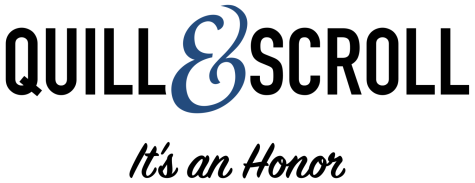Chat with Jackie Majerus
Jackie Majerus co-founded the educational non-profit Youth Journalism International in 1994. Since then, she has grown the organization into more than a phenomenal writing experience. Jackie goes above and beyond to ensure success for her students and it shows. Listen here to discover her insights about journalism and hear about her many outstanding experiences.
Read along with the audio here:
Marni: Hi Listeners, this is Marni Wax with Quill and Scroll, reporting about Jackie Majerus. Hi Jackie, how are you?
Jackie: Hi Marni! I’m good, thanks!
Marni: Thanks for being here with us today. Jackie is the founder of the Youth Journalism International organization and I’m just really excited to hear about who you are, and what you do, and hear some fun tips and advice that you have for us.
Jackie: Thanks, it’s great to be here
Marni: So, can you tell us about yourself?
Jackie: I am a 1988 graduate of the University of Iowa. I am a co-founder of Youth Journalism International which is an educational, non-profit 501c3 organization that has students all over the world.
Marni: That’s so interesting. And how did you come up with an organization like this?
Jackie: Well that’s a pretty long story but I’ll tell you a shorter version and that is that at a newspaper I was working at in Connecticut, the editor believed very strongly in bringing on young people but he really didn’t like young people. And he suspected that many I did, so he invited me to take over this little program. It started with a local group and we did that for a few years and then we started hearing from my husband, he created a website and he’s my co-founder. He created the website because the kids did a really impressive project on teen suicide and we didn’t want to see it go in the recycling bin. So once we went online, we started hearing from young people all over the place that they wanted to participate. And initially it was just a person here or there with one or two things they contributed, but then we got a young woman from Singapore and she was really excited about it. She just started participating just like everybody who is local, and I kind of had a lightbulb go off and I realized that we could work with people and they didn’t have to be in the town that we were living. So that’s how it went.
Marni: you said teen suicide and I know that you touch on a lot of different topics that are harder for people to report on and harder for people to understand. What is your best advice for high school journalists, and even professionals when they are covering issues such as teen suicides or racism or sexual harassment?
Jackie: well I think that it’s very important to be respectful of the people that you are interviewing and have compassion for them because these are some really painful subjects and asking them to talk about something that’s hurtful to them. If they are willing to talk to you, that’s great and you have to treat them with respect. Have a really open mind about your topics and not go in with some preconceived ideas. You have to go in with an open and curious mind and a compassionate heart I think, and you’ll do well.
Marni: So tell us about why you are here. I know you have a program and I know that visiting Iowa you have a very specific reason why you are here. Can you tell us about it?
Jackie: Well a couple of reasons, but first I was invited to be the keynote speaker at a forum at the Iowa City Public Library on Saturday about the effects of violence and terrorism on young people. And because so many of my students have written about the impact of violence and terrorism on themselves, or their countries, or their cities or schools, I have an understanding of that subject and all of those students were not able to be here so I was privileged to be able to speak for them, and share some of their stories. I’ll be speaking tomorrow at the Iowa High School Press Association Conference, which was a happy coincidence. I also visited a few schools and a few rotary clubs while I was in here so I got to spread the gospel of youth journalism international everywhere I go.
Marni: When you are presenting to students, or speaking to a group of people, what is most important for you to get across to them about these stories or about how people are presenting them or writing about them?
Jackie: I think journalism is so important. It is such an important part of our democracy that if there are any student journalists I try to give them a little pat on the back because they need encouragement. I think that’s pretty important considering our first amendment and our entire profession is under assault right now. The president of the United States calls us an enemy of the people. It’s pretty important that kids get reinforcement if they want to go into journalism and I think its important to have open eyes and have more of a media literacy or understanding of the roll of the press. So I try to talk about that a little bit too.
Marni: do you think that journalism has changed…well obviously it has changed with technology…but do you think that the way that people approach and report stories has changed as well?
Jackie: well, sure because everything is so much faster and so much up to the minute so yes that changes and an average reporter is not just writing they are also often times doing video or recording in some way or taking photographs or providing photographs, and they are often required to be on twitter and Facebook and promoting all over social media. It’s a much more frenetic job than it used to be.
Marni: I agree. I definitely agree. So I saw on your website that you had a presentation called “People for free press, a First Amendment right”, can you tell me about that too?
Jackie: The one in Seneca Falls, New York? Well that was a thrill. To be invited to speak at the National Women’s Rights park, it was in March of this year, and I was on a panel of other journalists and we just talked about the first amendment being under assault and what the role of journalists is.
Marni: do you think that high school or journalisms students specifically that are now learning how to write and they are watching the media, do you think that their expectations of what they have to produce is different than what it used to be? Or do you think that there is still a value in being engrained in being newsworthy, and stating proper facts and fact checking?
Jackie: I think that it depends on their instruction. If they have good instruction, then they know that they need to be consistent and ethical and stick to the facts. But if they don’t have very good instruction then they could be all over the place.
Marni: For our instructors listening, what do you think is most important for them to preach?
Jackie: Well I think ethics are really important and I’ve heard a lot of horror stories but I also know there are really great high school journalism teachers out there. I’ve connected with quite a few of them. We have a contest every year for young journalists, anyone up to the age of 19. We see the work that comes in, and one of the categories is journalism educator of the year and that particular category is always inspiring because of what the young people say about their teachers. I think that students relating to individuals is really important and also inspiring them to be courageous and get that story that’s what they need to do and sometimes teachers face a lot of road blocks.
Marni: Well obviously in your life, you have had some good teachers along the way. So what was your involvement in high school and college with journalism?
Jackie: As a high school student I participated in my school newspaper in Cedar Falls. I participated as a student and then I went off to the University of Iowa summer camp and I got really fired up and I went back and had the job of editor of the paper. I didn’t realize that it was supposed to be a figure head job only and that was a little frustrating for me because I really wanted to make a change and make a difference. So I ended up starting my own paper and published my own newspaper about my high school community and that ran from Halloween, every other week until graduation so I’m very proud of that. That’s what I did in high school. In college, I was working a lot and studying but I took a lot of journalism classes and the very best teacher I ever had was Mary Ann Sulsetti and she is teaching at Kean State now. She really had a passion for it and she really inspired me so I draw some of my…and she cared about her students as individual people as well as young reporters. So that inspires me.
Marni: I think that I had that too when I was in high school, specifically I had some English teachers and yearbook sponsors that really took an interest in my personal life as well and having that connection made me succeed academically.
Jackie: It’s a tough time of life. It really helps to have adults that are supportive.
Marni: Along with supporting people, what are some of the biggest stories that you have had high school journalists uncover?
Jackie: The suicide package was excellent. They did a lot of record searching. That was a big group project. I had one student from Nigeria a couple of years ago write about a massacre that had occurred in a small village in Nigeria and how the people were recovering from that. The interesting thing was that when I went to plot the place on a map and put a little graphic in with it to show where it was, I couldn’t find it on National Geographic maps or Google maps. And I realized that this was a place that was not on a map. The New York Times didn’t have the story, they didn’t have anything about it but we did because it was from the area that he took pictures of, he wrote the story, and I believe he wrote that story along with others on a t-9 phone if you know what I mean. You have to punch the letters out, so that was really determination right there and I did find a tiny reference to the massacre at that village in another publication. I didn’t doubt my student but I always check. It definitely happened, it was just so remote that nobody touched it so I was proud of that. I am so proud of so much we have done. Child labor, several stories about child labor. Including one early on from Nebraska about corn de-tasseling and what kids do and that was more of a personal retrospective by the kid who was de-tasseling but you could tell what a tough and horrible job that was. And we’ve had stories about other young laborers and various pieces about terrorism and also those kinds of stories like move your views and anything a regular newspaper does we do it.
Marni: obviously you are emotionally invested, in your students especially, how has it been for you emotionally reading these stories and communicating with the kids and hearing about what they have been going through and how has the effected the relationships that you have had with them?
Jackie: I know that what we are doing is changing lives. We are changing lives and that is extremely rewarding. I’ve watched them grow from age 13 to in their…well some of them are pretty old. I don’t think I have any that are 40 yet but I have little grandbabies that are my student’s children and watching them go through things, I try not to just watch. I try to be supportive and I guess I would like to mention that besides the obvious journalism that we do we also bring young people together in a peaceful and productive way through journalism but they are also becoming friends with each other so these are really bright and ambitious young people and they are friends with people in other countries that they probably wouldn’t have ever met. There is kind of a network, they call it a family and I think that’s pretty right on.
Marni: I agree. Well tell me your advice for people that want to be a Jackie Jr. one day. A few do’s and don’ts on the journalism field.
Jackie: (laughs) Okay, have an open and curious mind. Be brave. Have a sense of humor. Read newspapers. Even if it’s not paper, READ READ READ good and solid news reporting. And try to maintain a sense of compassion for other people.
Marni: Jackie thank you so much for being here with me today. Check out Youth Journalism International and see what Jackie is all about. Again this is Marni Wax with quill and scroll, thanks for listening!


Leave a Reply
Want to join the discussion?Feel free to contribute!